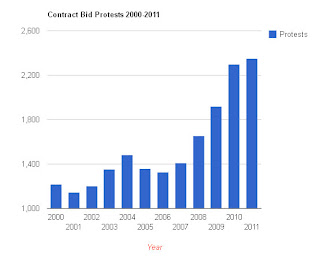Due to the nature of public construction projects where changes frequently occur, it's not surprising that there are often disputes. Traditionally, disputes that are not resolved at a lower level may end up in an expensive lawsuit with an unpredictable outcome.
Partnering: Partnering
is a tool that is used most frequently on larger projects. In
partnering, the public agency, contractor, designer, and any other key parties
participate in a retreat-like meeting prior to the
start of the work. The agenda for a partnering session may include:
- Communication protocols
- Identifying potential risks
and problems with the project
- Strategies to mitigate against project risks
- Developing personal relationships between team members
The partnering session is conducted in a spirit of cooperation. It’s much easier to try to “partner” with the other parties before tensions rise and relationships become frayed. The
hope is that in partnering, relationships will be established to such a
degree that it will help the parties to successfully navigate through
the project. Often, a professional facilitator
is hired for the partnering session. At the end of the
partnering session, the participants sign a contractually non-binding agreement summarizing their intent to work cooperatively with one another during the project.
Disputes Review Board: Typically
used for larger projects, a Disputes Review Board (DRB) is used during the
project to help informally adjudicate disputes between the contractor
and owner. Often, the DRB will include three members, one member is appointed by the owner, one by the contractor,
and the third member jointly appointed by the other two members. Once on the DRB, however, their loyalty is not to who appointed them, but to the project and looking objectively at disputes. Often DRB members are retired contractors or construction managers. During
the course of construction, the DRB members meet somewhat regularly
on the job site to review the progress of the project and to become
familiar with brewing issues. If a dispute arises, the DRB hears from both sides and makes a decision. It is most effective if the parties have agreed that the decision of the DRB will be binding. This helps from keeping issues from moving onto more serious forms of dispute resolution, such as court.
Project Neutral: The purpose of appointing a Project Neutral is the same as using a Disputes Review Board. However, unlike the Disputes Review Board which has multiple members, the Project Neutral consists of just one individual agreed to by all parties. The Project Neutral is generally a seasoned construction expert. This individual keeps current with issues on the project, perhaps by attending monthly progress meetings. They provide a fair and impartial opinion when disputes arise between the contractor and owner, and help the parties in coming to agreement.
Mediation: When a dispute arises, the parties choose an impartial third party mediator - often a construction attorney. The mediator's role is to help each party understand the
position of the other party, and to make recommendations for resolving the dispute. Mediation
is an informal, non-binding tool to bring both parties to the table
with the mediator. The goal is to resolve the issue short of proceeding with a lawsuit. The parties decide whether to agree to the resolution of the dispute as proposed by the mediator.
Arbitration: Arbitration is one step closer to a lawsuit and more formal than mediation. In
order for arbitration to be effective, the results of arbitration
should be binding on both parties, something that would be agreed upon
in the actual contract between the parties. Like a
mediator, an arbitrator, who is an impartial third party agreed upon by
both parties, hears from both parties about their position. Unlike
a mediator, however, who tends to have more separate conversations with
each party, the arbitrator’s role is to consider the positions of both
parties and render a decision. Arbitrators tend
to “split the baby” and come up with a resolution that represents a
compromise but doesn’t necessarily address the merits of each case. This is one of the risks in using arbitration. In addition, arbitration is more formal than mediation and may cost almost as much as a lawsuit. Arbitration is conducted in accordance with rules established by an arbitration association such as the
American Arbitration Association.
Lawsuit: This is a step to avoid if possible. It
can be very costly and may not be worth it financially if the dollar
amount of the dispute is smaller (less than the amount of attorneys fees
for the lawsuit). In addition, when a case goes to court, it may be heard by a judge or jury with limited construction expertise, and the result may be unpredictable.
Bottom Line: Attempt
to resolve contractual disputes and problems at the lowest possible
level, and communicate clearly and consistently during the contract with
the other party. There’s no substitution for such communications.










